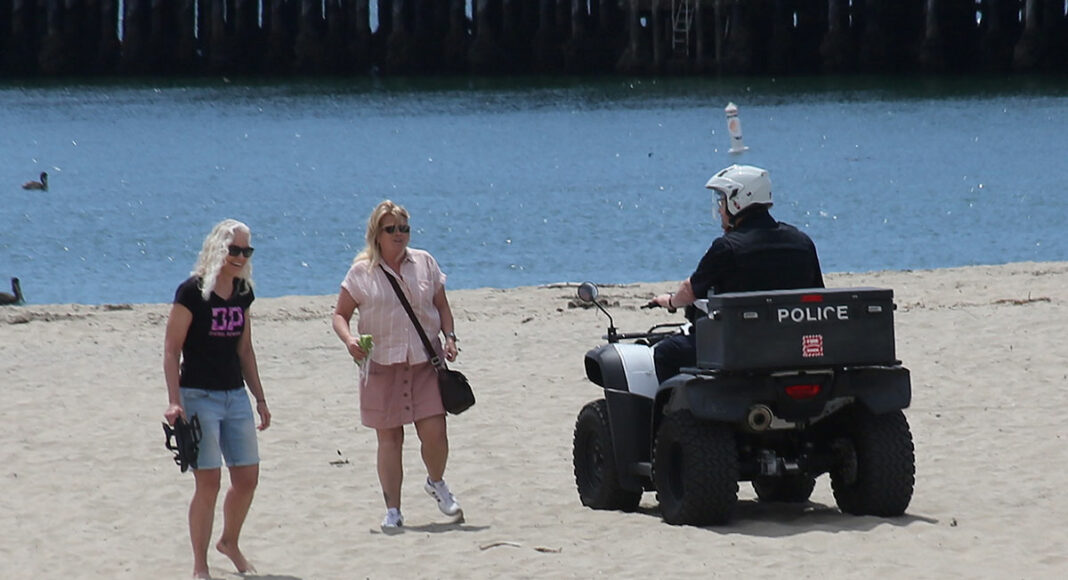Santa Cruz County’s latest round of shelter-in-place health orders remain in effect until Health Officer Dr. Gail Newel rescinds them. Although the latest slate of rules loosened certain restrictions, Newel has closed the county’s beaches to many activities between the hours of 11am and 5pm.
Running, walking, and cycling will be prohibited during those hours. Surfing, swimming, paddle-boarding, kayaking and other water activities are allowed, and people may cross the beaches to partake in them. Parties and lounging on the beach are prohibited at all hours.
The aim is to slow the spread of the novel coronavirus that causes COVID-19.
Santa Cruz County Sheriff Jim Hart announced Friday that his deputies—along with law enforcement officials across the county—are ready to enforce the beach restrictions.
“All the local law enforcement agencies are in support of this order, and they are going to do everything they can to support this order,” Hart said.
The rule will likely stay in place for “a few weeks,” Hart said.
The restrictions were crafted, Hart said, to discourage out-of-town visitors from making day trips and congregating on Santa Cruz County beaches, while keeping them open for shorter hours for locals.
“I think this order strikes a real balance,” Hart said. “It provides our community members access to parks and beaches during certain hours.”
The orders were partly prompted, Hart said, by the hordes of people seen on beaches over the previous weekend.
“There were certain portions of the coastline that were just a mess,” he said. “The health officer was very concerned about it, I know that local law enforcement was very concerned about it, it and so some adjustments had to be made.”
Also last week, Gov. Gavin Newsom unveiled his own beach-related rule changes when he announced the closure of beaches in Orange County after large throngs of people were seen congregating on beaches there.
Locally, Hart has said that anyone caught in violation of the orders could be warned or hit with fines up to $1,000.
Sheriff’s deputies have so far written 300 citations, Hart said.
The county has also limited stays at hotels, bed and breakfast establishments, and rental properties to only essential workers. Newel’s latest version of the local shelter-in-place order does allow for previously banned activities like landscaping, construction, gardening, childcare, and golf courses, provided that participants can practice social distancing.
Businesses found in violation of the health order can face a $1,000 fine and possibly lose their permit, Hart said.
When it comes to enforcement, Hart said that law enforcement officials will normally start by warning people in violation of the order, but he warned that repeat violators, or those committing egregious violations, can expect hefty fines.
“We’re going to take this order very seriously,” Hart said. “We don’t want people coming here from outside the area–it’s not appropriate right now, according to the health officer. If there’s people in large groups, if there’s people who have been warned on the beach or if there’s people drinking or doing other things on the beach, they are going to get a citation.”
Hart, who oversees the Santa Cruz County Jail, said the criminal justice system has implemented changes to prevent a coronavirus outbreak among inmates.
Contact visits have been cancelled, and workers and inmates are all screened for symptoms of COVID-19 before they enter.
A Superior Court judge authorized the release of inmates with 60 days or less on their sentence, Hart said, adding that the jail no longer accepts misdemeanor arrests.
Those measures have helped reduce the jail population and enabled officials to establish quarantine and isolation units, allowing a 14-day quarantine for all incoming inmates, Hart said.
An outbreak in the jail, Hart said, could easily exhaust hospital resources.
“We’re doing everything we can to make sure that people who are staying in our county jails are not exposed to this virus,” he said.











